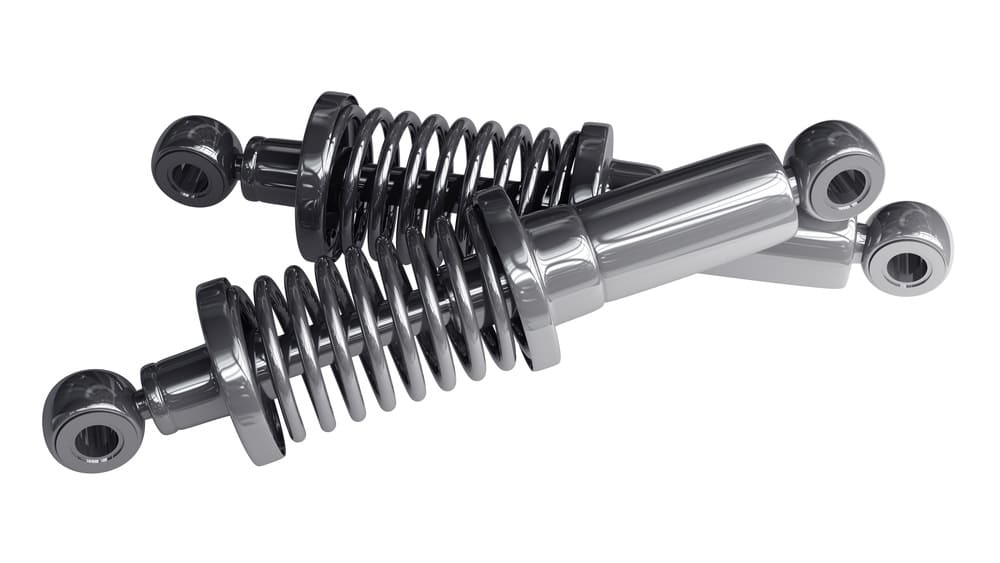

Every car, truck, and utility vehicle sold today has at least one shock absorber (informally known as a shock) for each of its wheels. (Note that sometimes these shocks are called struts. A strut is simply a shock absorber that is located inside a coil spring, the name is different but the function is the same.)
How a shock absorber works
A shock absorber or strut consists of one or more pistons that flow through a thick oil as the wheel to which it’s attached moves up and down. The motion of the piston through the oil converts mechanical energy to heat, damping the motion and helping bring it to a stop; this helps to stop the wheel from bouncing after each bump. The oil and the piston are sealed within a closed container and under normal conditions oil doesn’t get out and none ever needs to be added.
Note that a shock absorber doesn’t actually absorb the shock of a bump; that’s the job of the springs and certain other components of the suspension. Rather, the shock absorber absorbs energy. A vehicle without shocks would keep bouncing up and down for a while after every bump; the shock absorbs the energy of the bouncing.
Unfortunately, shocks and struts can break or wear out. The three things that are most likely to go wrong with a shock are:
The seals can become brittle or torn, allowing fluid to leak out; after some fluid (about ten percent of the total) is lost the shock loses its ability to absorb energy.
The entire shock, or the piston that moves inside it, can be bent from an impact; a bent shock may not move properly or it may leak.
Smaller parts inside the shock may wear out over time or due to an impact.
These problems are almost always due to one of two things: age and accidents.
Shock age: Modern shock absorbers and struts are designed to last several years and over 50,000 miles, but eventually the seals do wear out and they begin to leak. Your owner’s manual may specify a time or mileage for shock replacement, but this is a guideline, not an absolute: driving style, road conditions, and even how much dirt the shock encounters can have an effect.
Accidents: Any accident that involves the suspension has the potential to damage the shock absorbers; a bent or dented shock almost always needs to be replaced. After a major accident the repair shop will examine your shocks to see whether they need replacement, but it’s important to understand that for this purpose, “accident” includes not just serious crashes but also anything that jars the suspension particularly hard, including hitting curbs, large rocks, and deep potholes, or even a rock being kicked up against the shock as you drive on a dirt road.
When any of these things goes wrong it’s almost always necessary to replace the shocks, as they usually can’t be repaired or simply refilled. Also, it’s important to replace a failing shock as soon as possible, because a car with a bad shock absorber can become difficult to control in an emergency due to excessive wheel bounce.
With all this in mind, how can a vehicle owner tell that a shock needs replacement? For one thing, the driver may notice one or more changes:
- Ride may become bouncy
- Steering wheel may vibrate (if it’s front shock that has gone bad)
- Vehicle may “nose dive” more than usual upon braking
- Tire wear may increase
Since many of these effects can also be symptoms of poor alignment or other mechanical problems, it’s best to take the vehicle to a qualified mechanic if you notice any of them; you may not need new shocks after all (and alignment is quite a bit less expensive than new shocks).
Alternatively, your mechanic may notice a leaky or damaged shock when inspecting the vehicle or performing an alignment. In fact, in some cases alignment will be impossible if a shock absorber (or particularly a strut) is damaged. If the shock is just leaking, alignment will still be possible but a good mechanic will notice the leak and advise the owner. (Also, a mechanic will be able to tell a true leak from the slight dampness that sometimes results from the normal operation of a healthy shock.)
Finally, after an accident your mechanic should inspect any shocks or struts that may have been involved, as replacement may be necessary. If you’re in an accident that doesn’t seem to require any repairs (such as hitting a pothole hard) be particularly attentive to any possible changes in your vehicle’s ride or handling; you may want to have the vehicle inspected just in case.
One final note: If you’re replacing a shock absorber, because of age and wear or an accident, it’s almost always best to replace the pair (both fronts or both rears), because a new shock will work differently (and better) than an old one and the imbalance may be hazardous.



